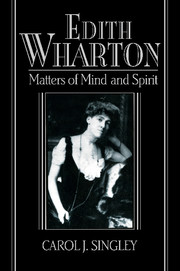
-
Select format
-
- Publisher:
- Cambridge University Press
- Publication date:
- August 2010
- July 1995
- ISBN:
- 9780511549595
- 9780521472357
- 9780521646123
- Dimensions:
- (228 x 152 mm)
- Weight & Pages:
- 0.59kg, 284 Pages
- Dimensions:
- (228 x 152 mm)
- Weight & Pages:
- 0.42kg, 284 Pages
- Series:
- Cambridge Studies in American Literature and Culture (92)
- Subjects:
- Literature, Area Studies, American Literature, American Studies, Literary Theory
You may already have access via personal or institutional login- Series:
- Cambridge Studies in American Literature and Culture (92)
- Subjects:
- Literature, Area Studies, American Literature, American Studies, Literary Theory
Book description
Edith Wharton: Matters of Mind and Spirit, first published in 1995, makes the case for Wharton as a novelist of morals rather than of manners; a novelist who sought answers to profound spiritual and metaphysical questions. Focusing on Wharton's treatment of Anglicanism, Calvinism, Transcendentalism, and Catholicism, Carol Singley analyzes the short stories and seven novels in the light of religious and philosophical developments in Wharton's life and fiction. Singley situates Wharton in the context of turn-of-the-century science, historicism, and aestheticism, reading her religious and philosophical outlook as an evolving response to the cultural crisis of belief. She invokes the dynamics of class and gender as central to Wharton's quest, describing how the author accepted and yet transformed both the classical and Christian traditions that she inherited. By locating Wharton in the library rather than the drawing room, Matters of Mind and Spirit gives this writer her literary and intellectual due, and offers fresh ways of interpreting her life and fiction.
Reviews
‘… Whartonians and Americanists will welcome this book.’
Source: American Literature
‘The strength of Singley’s vision lies in its final refusal to categorize Wharton’s thought … Matters of Mind and Spirit marks a new trend in Wharton criticism.’
Source: Modern Fiction Studies
Contents
Metrics
Altmetric attention score
Full text views
Full text views help Loading metrics...
Loading metrics...
* Views captured on Cambridge Core between #date#. This data will be updated every 24 hours.
Usage data cannot currently be displayed.
Accessibility standard: Unknown
Why this information is here
This section outlines the accessibility features of this content - including support for screen readers, full keyboard navigation and high-contrast display options. This may not be relevant for you.
Accessibility Information
Accessibility compliance for the PDF of this book is currently unknown and may be updated in the future.


